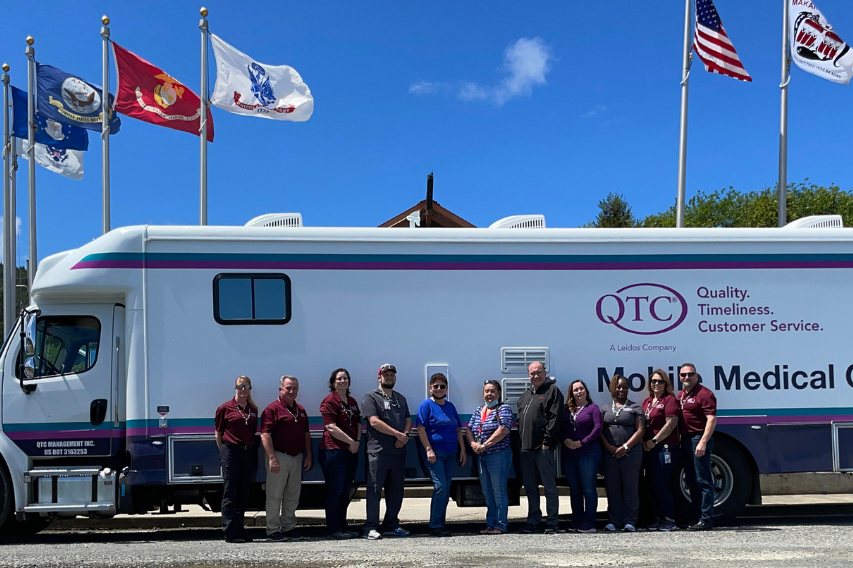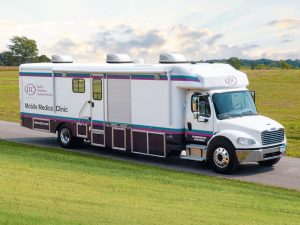
Tribes Host Leidos QTC’s Mobile Medical Clinic For Native Veterans
Key Takeaways
- We’re changing the way healthcare is delivered to rural and underserved communities by traveling nationwide in Mobile Medical Clinics that are equipped with medical equipment for a wide variety of exams.
- We prioritized respecting each reservation’s sovereignty and culture, along with collaborating with Tribal leaders to provide services for Native Veterans.
- Native Americans serve in the military at five times the national average, have high rates of disability, and may live far from VA medical facilities.
In June 2021, the Makah Indian Reservation and Port Madison Indian Reservation hosted Leidos QTC Health Services to provide Compensation & Pension (C&P) exams in our Mobile Medical Clinic (MMC).
This was the first time each tribe allowed a government contractor into their reservations.
Healthcare On the Go
For more than 40 years, we’ve performed medical exams for government agencies across the United States. We’re now averaging about 900,000 exams per year with a specialty in Compensation & Pension (C&P) exams for Veterans Affairs (VA). Our clinics and offices streamline the exams process for Veterans and other claimants nationwide.
But there are rural communities with Veteran populations who have challenging commutes or don’t have access to transportation.
We are changing that by traveling across the country in our fleet of custom-built MMCs. Each MMC is outfitted with the necessary medical equipment for all kinds of exams, including radiology, audiology, general medicine, vision, mental health and other diagnostics.
Operated by a handpicked team, the MMCs have the capability to go long distances and into underserved communities. The VA partners with Leidos QTC Health Services to process claims on the spot at MMC events, reducing average wait times from 100 days to two weeks.
Our mission to reach underserved communities brought us to Washington, where we serviced Suquamish, Makah, and Lower Elwha Klallam Veterans.
Building a Partnership
We have driven our MMC to rural areas such as Alliance, Nebraska, but we needed to prepare a little differently this time. Federal agencies and other similar companies are not allowed onto Tribal reservations without special permission granted by a Tribal council. In the past, similar companies have sought permission to provide services on Tribal reservations but weren’t accepted.
As the largest provider of medical examinations for Veterans, we know that earning the trust of our partners is crucial. Our Vice President of Emerging Health Operations Daniel Highland prioritized respecting the rules and land of the Makah and Suquamish. The Leidos QTC Health Services team collaborated with a Tribal Liaison to effectively communicate with each Tribe’s council.
Native Americans in the Military
Native Americans serve in the military at five times the national average. For over 200 years, they’ve fought in every major military conflict— from the Revolutionary War to ongoing operations worldwide.
Nationally, they have a higher rate of disability within the overall Veteran population: 36.4% compared to 26.2% of all other demographics. There are approximately 6,500 Native American Veterans in the state of Washington. However, many live far from a VA medical facility and have difficulties completing the exams required for disability claims.
Makah Indian Reservation
Located on the coast of Washington, the Makah Indian Reservation is a five hour drive and ferry ride to the nearest VA medical facility. There is only one paved road that connects it with the rest of the state, and it has frequent mudslides and rainfall. Before the 1930s, the reservation was only accessible by sea.
The Makah know themselves as Qwi-dich-cha-at, which means “people who live near the rocks and the seagulls” in their Salish language. Beginning in World War I, they sent soldiers to serve in every major conflict of the twentieth century.
For our two-day C&P event, the Leidos QTC Health Services medical team stationed the MMC near their town hall and Indian Health Clinic. There are no house addresses on the reservation, so the Tribal Liaison transported some of the Veterans to their appointments. As the team provided exams, the VA representative processed claims.
Tribal Elders hosted a dinner and ceremony to thank the team. An Elder sang a traditional song, and each Elder gave everyone a necklace of shells that are only found on the shores of their reservation.
“Knowing that this was the first time they allowed anyone on their reservation made me feel honored,” one Leidos QTC Health Services team member said.
Port Madison Indian Reservation
The Port Madison Indian Reservation is home to the Suquamish Tribe. Their name is inspired by the Lushootsheed phrase D’Suq’Wub, which translates to “people of the clear salt water”. Located in the Puget Sound area, their people have a long history as fishermen, canoe builders, and basket weavers.
Leidos QTC Health Services set up the MMC at a neutral community center called the House of Awakened Culture, where the Suquamish welcomed Veteran members of the Lower Elwha Klallam Tribe. At the House, they host celebrations, ceremonies, and cultural activities for Tribal communities throughout the region.
Tribal Elders and Council Members honored Highland, a disabled Veteran and nurse, in a sacred blanket ceremony. Often used for religious practices, trade, and gifts, the blankets are woven on wool looms. Blankets represent the Tribal nation and warmth of safety and trust. It’s a custom for Elder women to wrap honorees in a blanket as a mother would wrap her son, and they did just that for Highland. They welcomed him and the Leidos QTC Health Services family to their home.
“Being able to lead a team in the first ever Tribal event in VA and Leidos QTC Health Services history was an incredibly humbling experience,” said Highland. “It was my extreme pleasure to have the opportunity to support the Native Americans of Washington.”
Our Work Continues
Leidos QTC Health Services is organizing future clinic events for various Tribes throughout Washington in concert with the Seattle VA Regional Office and VA Contracting office. Additionally, we plan to meet with Native American leadership in Montana about providing services in their state.
Leidos QTC Health Services looks forward to working with more Tribes nationwide.


0 comments on Tribes Host Leidos QTC’s Mobile Medical Clinic For Native Veterans